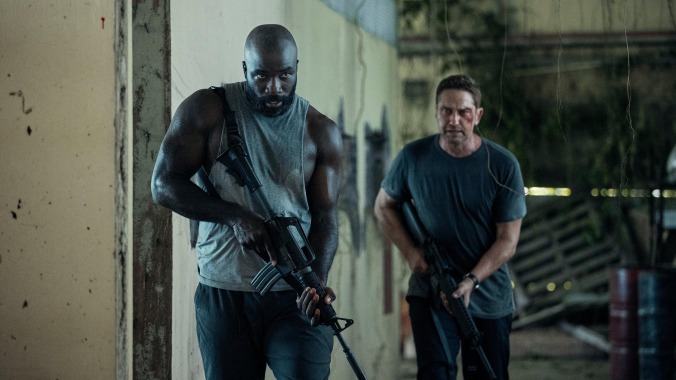Mike Colter talks Luke Cage, Evil, and his "slow burn" with Gerard Butler in Plane
After starring roles on the small screen, including as an erstwhile Marvel superhero, Mike Colter makes the most out of his first leading role in a film

Mike Colter acknowledges that most people know him for playing the eponymous character in Marvel’s Luke Cage. However, in a career that has spanned almost two decades Colter has been able to play a variety of roles, not just that indestructible superhero on Netflix. He was Lemond Bishop, the powerful Chicago drug lord in the Emmy-winning CBS drama The Good Wife—a supporting role which led to a lead with the same showrunners, Michelle King and Robert King, in their latest hit, Evil. Three seasons in on Paramount+ and renewed for a fourth (The A.V. Club loves it!), the show mixes supernatural, religious, and romantic elements, and Colter shines as a Catholic priest grappling with his faith.
On the big screen, he’s appeared in Girls Trip (2017), Zero Dark Thirty (2012), and Million Dollar Baby (2004). But he’d never had any leading parts—until Plane. Colter co-stars with Gerard Butler in the action-adventure opening this week as Louis Caspar, an accused murderer being transported by the FBI when lightning hits the plane he’s on and forces it to land in the jungles of the Philippines. When mercenaries take most of the passengers hostage, it’s up to Caspar and the plane’s pilot (Butler) to save the day. Colter sat down with The A.V. Club to chat about Plane, working with co-stars like Butler and Regina Hall, and whether people tend to ask about his Marvel work or just for directions.
The A.V. Club: Your character in Plane is very enigmatic. In fact, for the first half hour, we hardly hear from him at all. How do you make an impact when you have no dialogue?
Mike Colter: There’s a couple of things that helped me when I first started out as an actor. I first got into the craft of studying as an undergrad. I studied at Rutgers University Mason Gross School of Arts, and I remember this from my director, Jim O’Connor, the head of the program. He’s directing this production of Mary Shelley’s Frankenstein. It was people from the graduate program who got most of the opportunities to work. And I was this very passionate undergraduate who had just transferred there. I was looking for opportunities to get on stage. I fancied myself as somewhat of a leading man who would be able to carry more weight and do productions that have bigger roles. So this graduate student dropped out. As luck would have it, I was able to get my hands on the creature role in the Frankenstein play. And what I learned from that, is that the first first time you see this character on stage, he doesn’t talk. He’s born and he discovers the world for the first time as he opens his eyes and everything is new and everything is a discovery. And that’s a great acting exercise because now the audience is watching you taking the world and that experience in life as like a baby would, except you’re a full-grown adult. It’s about eight minutes I’m not talking, and it’s just a wonderful way to really boil down what acting is. I studied [Sanford Meisner’s techniques] and I remember them really trying to impart in us that listening was as important as anything else in acting. I think a lot of people get really tied into, how many lines do you have? What’s the dialogue? You memorize all those lines. Memorizing lines is not what acting is.
AVC: How did you apply that to Plane?
MC: Listening is so important. So is observing; we observe people. And for me Caspar is observing and listening all the time, because you don’t know what he’s thinking. But he’s thinking something! Everything means something to him. He’s a handcuffed man being extradited, taken to another place. What is he thinking? What is going on in his mind? Everybody else has got a whole other set of circumstances. And as he watches them, he’s not with the group. He’s sort of on the outskirts. And not to give too much away, but circumstances change really quickly when his plane crashes. Those things are things that cameras can catch, but you don’t have to play them. You just have to be there. You have to be there in the moment with the circumstances and just respond. Everything means something. It’s like a heightened sense of alert at all times with him because he’s almost like an animal. I think that reads and people feel that.
AVC: There’s burgeoning friendship and respect between your character and Gerard Butler’s. Can you talk about that dynamic?
MC: Gerry is what I call him. Our relationship started just like the characters on the screen in some sense, because we didn’t know each other. We come from different cultures. There’s a vast chasm between the two of us in terms of space. He’s from Scotland, I’m from South Carolina. But there are all sorts of things that we had in common. And there’s a kindred spirit there sometimes. It’s like a blind date. So our friendship off screen mirrored our relationship on screen. Whatever we could pull from that mutual respect and admiration that comes from working together. It was a slow burn in terms of watching that work, and then we’re working simultaneously at the same time on screen, trying to get these characters and get this thing to work. I think it plays well for those purposes.
 Keep scrolling for more great stories.
Keep scrolling for more great stories.
